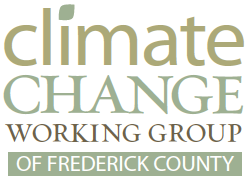Envisioning Frederick County through the lens of climate change
The Climate Change Working Group (CCWG) of Frederick County was founded in 2016, to bring together community volunteers to address climate change at the local level. We research aspects of climate change that affect our community (see diagram) and apply a holistic approach to analysis that focuses on the way the aspects interrelate. Our goal is to address climate change from a systems perspective. We discuss recommendations based on our research and advocate for them through outreach, education, planning and policy development. We welcome alliance and cooperative work with others seeking similar goals. Meetings are open to all.
CCWG affiliations include the Smarter Growth Alliance, Envision Frederick County, and the Heart of Maryland Stewardship Work Group. We have actively participated in Frederick County government initiatives, such as Livable Frederick and the Monocacy Scenic River Plan. We have broadened our reach through the formation of the Multi-faith Alliance of Climate Stewards. We have worked on legislative issues with the Sierra Club and the Chesapeake Climate Action Network.
We offer an extensive library of online reference materials relating to climate related issues. The library can be accessed at:
Vision: A resilient creative community, with a healthy self-sustaining local economy that is not dependent on fossil fuels. Some things this might mean include:
- “Zero waste” policies and practices
- A local ecosystem returned to balance, with migration corridors that allow climate-stressed plants and animals to move north or to higher elevations
- Protected water sources that are safe and sufficient for aquatic species, agriculture, wildlife, and humans to thrive
- An electric public transportation system along well-planned population corridors that reduces reliance on cars
- Abundant employment opportunities that enrich the community via profits that circulate locally
- Human health is impacted by stresses caused by poor air quality, excessive heat, and food insecurity.
Mission: To prepare Frederick County administrators and residents to adapt to and mitigate the impact of a changing climate through responsible planning, education and advocacy.
Leadership
Executive Committee
Karen Russell — Founder
Ed Grayzeck — Acting Chair
Krista Markstrom-Boon — Administrator
Joanne Horn — Member
Jenny Thomas — Member
Meetings
All meetings during 2022 take place 10–12 a.m. on the following Saturdays:
August — No meeting
September 17
October 15
November 19
December 17
Contact Us
For more information, mail ccwgfredco@gmail.com
